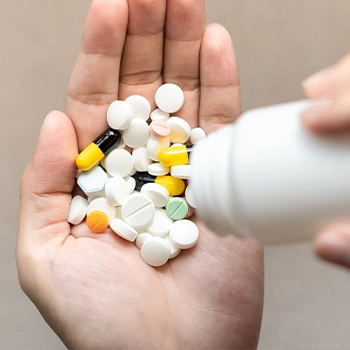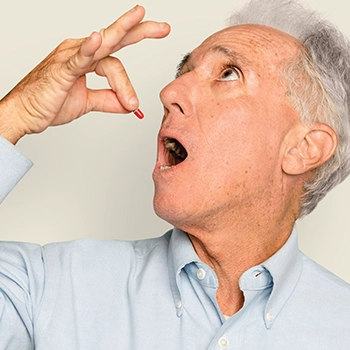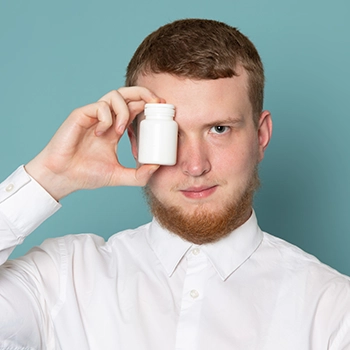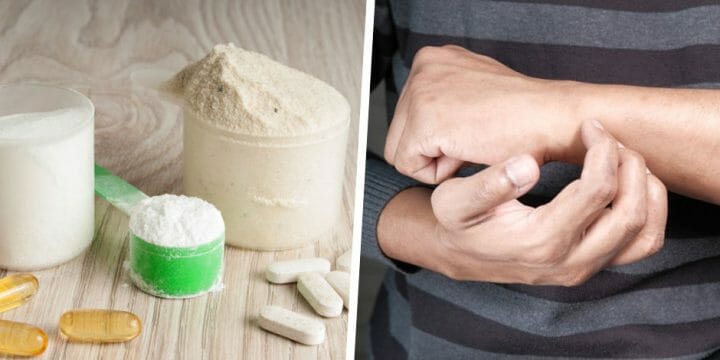Nootropics are natural or synthetic substances known to improve brain health and mental performance.
However, in an era where foods and supplements contain so many artificial and harmful substances, it’s only natural to wonder whether they’re safe.
And being in the medical industry for over a decade has definitely taught me one thing: you must dive into the science.
So, I spent a couple of months reviewing the scientific literature on nootropics and their effects with the help of a colleague dietician to answer this question.
Let’s jump right in.
Quick Summary
- Nootropics, both natural and synthetic, are generally safe for improving brain health and mental performance when used responsibly.
- While natural nootropics are usually safer due to their organic origins, synthetic ones can pose risks if misused or combined with certain medications.
- Dr. Corneliu Giurgea, the father of nootropics, stated that any cognitive enhancer causing side effects under normal conditions should not be considered a true nootropic.
- Personally, I believe that while nootropics can be beneficial, they should be used with caution, and users should always consult healthcare professionals before starting any supplementation.
Are Nootropics Safe?

From my experience, nootropics are safe under normal usage, but it's crucial to consider type, dosage, and combination.
In other words, if you’re a healthy adult who takes the recommended dosage of nootropic dietary supplements, you’re in the clear.
According to Dr. Corneliu Giurgea (who’s considered the father of nootropics), any cognitive enhancer that causes side effects under normal circumstances cannot be deemed a true nootropic [1].
Let’s take a look at some benefits of these compounds.
Benefits of Nootropics
Drawing from research and my clinical experience, nootropics offer several benefits like:
- Memory and cognitive enhancement: Nootropics are generally known to enhance cognitive function and improve memory through a number of mechanisms [2].
- Suppressed age-related mental decline: Certain nootropics may help you fight age-related brain diseases by preventing the aging of brain cells, according to the research published in PubMed [3].
- Increased blood flow to the brain: Nootropics increase blood circulation to the brain and increase its overall activity, based on the study published In PubMed [4].
- Improved brain health and function: Nootropics can help maintain proper brain health and functioning [5].
What Makes Nootropics Safe?

The fact that their benefits significantly outweigh their supposed risks is what makes nootropics safe.
Once again, as Dr. Giurgea said, if a nootropic isn’t safe, it’s not a real nootropic.
To better understand what makes a nootropic supplement safe, we need to distinguish between the two classes of nootropic drugs: natural and synthetic.
Natural nootropics are plant-based compounds that improve cognitive function. They’re usually consumed as herbs, plant extracts, and foods.
I've found that natural, plant-based nootropics effectively improve cognitive function.
“Nootropic herbs, according to literature, may enhance your neurotransmitter levels while also increasing blood flow to the brain, increasing oxygen and nutrients.”
- Dr. Michael Lam, MD, Physician in Anti-Aging Medicine
Synthetic smart drugs (sometimes called prescription nootropics) are lab-made supplements, and they’re normally made with a combination of natural and synthetic compounds.
Natural nootropics tend to be much safer than their synthetic counterparts because they’re organic and usually used in some cultures for centuries.
What Makes Nootropics Unsafe?
Based on my clinical observations, factors such as megadosing, poor quality of ingredients, misuse, and medication interactions could make nootropics potentially unsafe.
Let’s take a look at each of these factors:
- Megadosing: This occurs when you consume the supplement beyond its recommended dosage. Many nootropics have dosage limits; when they’re crossed, they lead to adverse effects.
- Poor ingredient quality: Using a smart drug with poor ingredient quality and artificial ingredients can increase the chances of negative effects.
- Misuse: Misuse of nootropics can either come from unintentionally going over their recommended dosage (which can happen with natural and synthetic smart drugs) or out of dependence (which is usually a side effect of some prescription medications).
- Medication interactions: When taken with certain medications, some synthetic nootropic supplements pose serious risks to the user’s health.
Are Nootropics Safe For Everyone?

Based on my clinical experience, nootropics are generally safe for everyone, with a small subset of the population being sensitive to some of them when taken in varying amounts.
However, this doesn’t include people with a history of substance abuse or those who take medications that pose serious health risks when combined with nootropics.
Individual responses to nootropics can vary greatly, highlighting the necessity for personalized self-experimentation to optimize cognitive benefits.
Additionally, there are some smart drugs that require more research in human trials.
So, it’s best to avoid those until more human research trials are conducted.
Side Effects

In my practice, I've observed both natural and synthetic nootropic drugs come with certain side effects, with the latter having much more reports of adverse side effects.
Incorporating mindfulness practices can play a crucial role in mitigating the temporary and manageable side effects associated with nootropic use.
Side Effects of Natural Nootropics
While there aren’t many studies that show the negative side effects of natural nootropics (because these instances are so rare), here are the ones that I’ve noticed from personal experience:
- Brain fog
- Headaches
- Digestive issues
- Insomnia
These, however, mostly occurred when the nootropics were overused or not timed and combined well.
Side Effects of Synthetic Nootropics
Because they’re lab-made, a synthetic nootropic supplement is more likely to have adverse effects, according to the Innovations in Clinical Neuroscience [6].
Here are some of them:
- High blood pressure
- Altered brain chemistry
- Mild cognitive impairment
- Increased heart rate
- Insomnia and other sleep disorders
- Vision problems
- Addiction
Avoiding the Side Effects

There are some good practices to avoid the side effects of nootropics, such as:
- Go with the safest nootropics: Nootropics like L-theanine (an amino acid), for example, don’t have any negative risks.
- Don’t exceed the recommended dosage: Most nootropics come with recommended dosages, and exceeding them might cause side effects.
- Speak to your physician: If you’re on any medication or unaware of the effects of certain ingredients in a nootropic supplement, speak to your local physician before taking it.
- Take clinically-backed supplements: One of the best ways to avoid the potential risks of nootropic side effects is to take safe, natural, and science-backed supplements.
If you want to avoid the side effects, you may want to try nootropic foods instead.
FAQs
Do Nootropics Affect Hormones?
Yes, nootropics can affect hormones. They can alter your brain’s levels of neurotransmitters, hormones, and enzymes by increasing oxygen to the brain and stimulating nerve growth [5]. However, misusing nootropic supplements may lead to hormonal imbalance.
How Do Nootropics Affect the Brain?
Nootropics affect the brain by increasing blood circulation, providing it with essential nutrients, and boosting oxygen flow [7]. Additionally, they also manage inflammatory responses in the brain, which helps prevent cognitive decline and brain fatigue.
Do Nootropics Have a Permanent Effect?
No, nootropics don’t have a permanent effect. Some nootropics work as short-term cognitive enhancers; many others may improve brain function over time with continual use.
References:
- https://analyticalsciencejournals.onlinelibrary.wiley.com/doi/abs/10.1002/ddr.430020505
- https://www.ncbi.nlm.nih.gov/pmc/articles/PMC5021479/
- https://pubmed.ncbi.nlm.nih.gov/27656235/
- https://pubmed.ncbi.nlm.nih.gov/10978039/
- https://www.sciencedirect.com/topics/neuroscience/nootropic
- https://www.ncbi.nlm.nih.gov/pmc/articles/PMC4756795/
- https://www.ncbi.nlm.nih.gov/pmc/articles/PMC5021479/
About The Author
You May Also Like






